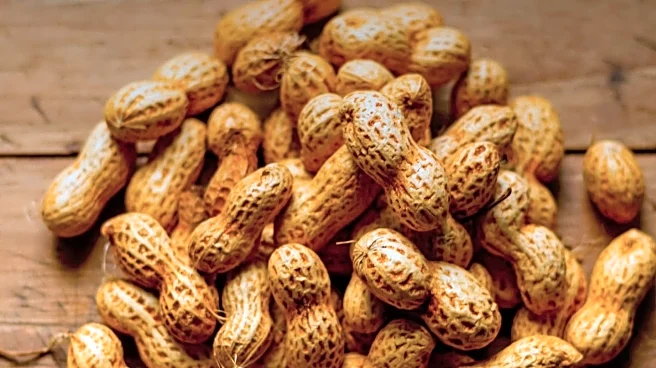What's Happening?
Peanuts, a popular and nutritious food source, are under scrutiny due to potential liver damage risks associated with aflatoxin contamination. Aflatoxins are toxic compounds produced by fungi, particularly Aspergillus flavus and Aspergillus parasiticus,
which thrive in warm and humid conditions. These toxins can contaminate peanuts during improper storage or processing, leading to serious health risks such as liver cirrhosis or cancer. The risk is heightened for individuals with pre-existing liver conditions like hepatitis or fatty liver disease. The article emphasizes the importance of proper storage and handling of peanuts to prevent aflatoxin contamination. It also highlights the need for consumers to purchase peanuts from reputable brands that conduct aflatoxin testing and adhere to food safety standards.
Why It's Important?
The potential health risks associated with aflatoxin-contaminated peanuts have significant implications for public health and food safety. Peanuts are a staple in many diets due to their affordability and nutritional benefits, including plant-based protein, dietary fiber, and healthy fats. However, the presence of aflatoxins poses a threat to liver health, potentially leading to severe conditions like liver cancer. This issue underscores the need for stringent food safety regulations and consumer awareness regarding the sourcing and storage of peanuts. Ensuring safe consumption practices can help mitigate health risks and maintain the nutritional benefits of peanuts.
What's Next?
To address the risks associated with aflatoxin contamination, there is a need for increased regulatory oversight and consumer education. Food safety authorities may implement stricter guidelines for peanut storage and processing to minimize contamination risks. Consumers are advised to store peanuts in airtight containers away from heat and humidity and to avoid consuming mouldy or discolored peanuts. Additionally, diversifying nut intake and consulting healthcare professionals for those with existing liver conditions can help manage potential risks. Ongoing research and public health campaigns may further inform safe consumption practices and enhance food safety standards.
Beyond the Headlines
The issue of aflatoxin contamination in peanuts highlights broader challenges in global food safety and supply chain management. It raises ethical considerations regarding the responsibility of food producers and regulators to ensure consumer safety. The situation also underscores the importance of scientific research in identifying and mitigating foodborne risks. Long-term, addressing aflatoxin contamination could lead to improved agricultural practices and storage technologies, benefiting both producers and consumers by reducing health risks and enhancing food quality.















